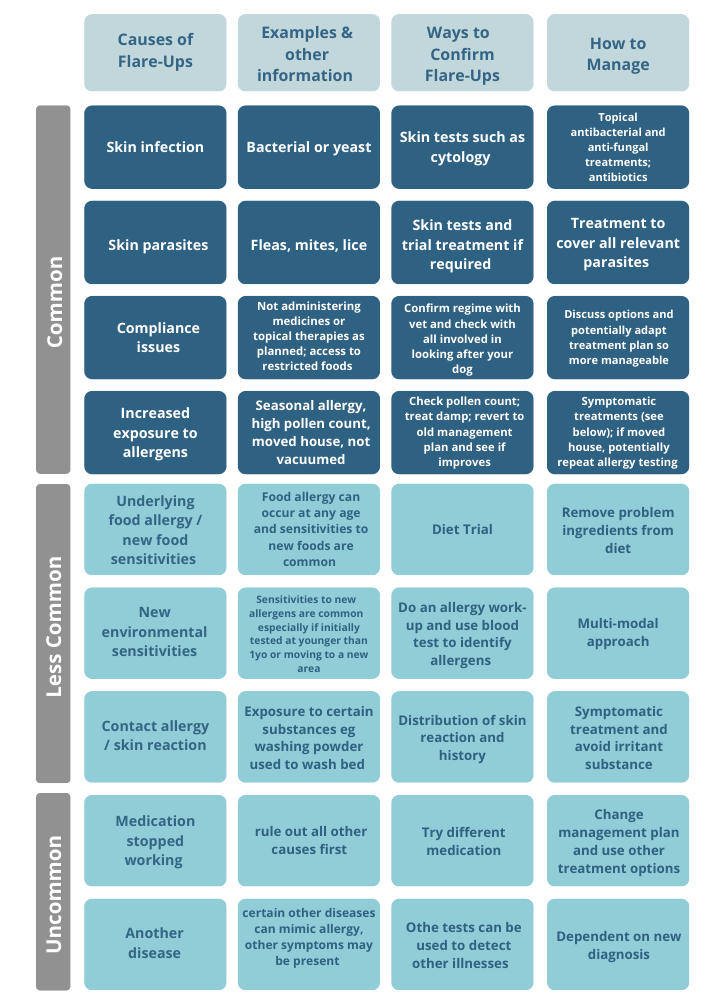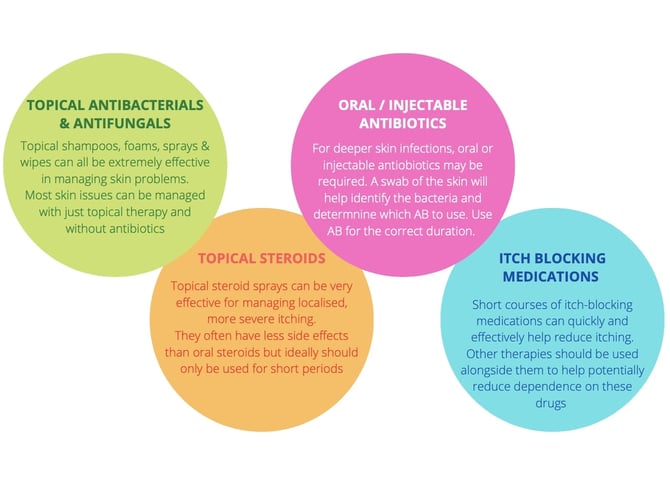Caring for your allergic pet long-term
As stated before, it is often impossible to cure an allergic pet completely. However, by finding out the cause of the allergy and designing a suitable treatment plan, hopefully your pet's allergic symptoms can be controlled so that they can lead a happy life.
Due to the fact that allergy is unpredictable and allergens can increase from time to time, it is very important to have a proper maintenance protocol in place to keep allergy flare-ups to a minimum and keep your pet symptom free for longer.
What is a flare-up?
A flare-up refers to when the symptoms associated with allergy recur (often suddenly), or get significantly worse. It is important to understand that this is perfectly normal. Flare-ups are expected even in dogs who are well controlled as, like many other long-term diseases, symptoms will fluctuate over time and can be influenced by external factors. It is important to remember that a fare-up does not mean the treatment plan has failed, it is far more likely that a secondary issue has tipped the balance in the favour of the allergy (over good control) and needs addressing. Sometimes the treatment plan may need revisiting or adjusting which is why regular allergy reviews with your veterinary team are so important.
The good news is there is a huge amount that you can do to help reduce the frequency and severity of flare-ups.
What causes a flare-up?
There are many possible causes of flare ups as shown in this table:

Treating Flare-Ups
Once your vet has identified what triggered the flare-up, they will be able to advise an appropriate treatment - bear in mind this could be different each time!
Options may include using a short course of symptomatic treatment such as itch blocking medications to reduce the itching. This could be accompanied by one or more of the topical therapy options discussed previously which may help manage a bacterial or fungal skin or ear problem.

Preventing Flare-Ups
In order to keep your pet healthy for longer, there are several key things you can do to help keep the symptoms associated with their allergy under control.
Develop a flare-up radar:
There are often tell-tale signs that your pet's skin or ears are getting worse. If you can detect these changes early then there is a good chance you can intervene before they have a chance to flare properly.
Look out for nibbling of the paws, scratching their ears or a change in odour - all of which can be tell-tale signs.
Get support ASAP:
If you pick up any of the early warning signs, then contact your vet immediately so they can offer the best advice and treatment options early.
Learn to predict when flare-ups are likely :
Many allergies have a seasonal pattern. Identify when your pet is likely to have a flare up and then you can be prepared for the times of year when they are likely.
Maintain the skin and ears with topical therapy:
Prevention of symptoms is often the best cure.
Due to the fact that allergic patients have imbalanced skin and ear microflora, it is important that you use regular antibacterial +/or anti fungal shampoos, wipes, foams and ear cleaners to keep their skin, paws and ears under control.
Click on the Topical Therapy link below to find out more.
Communicate with your veterinary team:
Staying in touch with your veterinary team is key. If circumstances change and you need to alter the treatment plan for any reason then make sure you tell them as soon as possible. You can work closely with them to help prevent flare-ups and keep your pet happy and healthy for longer.
Allergen Avoidance
Although it is nearly impossible to completely avoid environmental allergens such as pollen and dust, there are things that can be done to help reduce exposure to them. By doing so, this may help reduce the severity of symptoms associated with your pet coming into contact with those allergens.
To view some of these allergen avoidance strategies, scroll through the slides below:










Any Questions?

IF YOUR PET HAS ALLERGY SYMPTOMS YOUR VET CAN HELP
Key facts to remember:
- Allergy is a very common disease in dogs and cats
- Be aware of any sign that might be indicative to allergy. Most of these signs can be considered normal behaviour so request an allergy check up with your vet
- It is important to identify which allergens are the source of the allergy so they can be avoided and your pet can be treated
- The first choice for treating allergy is immunotherapy, a custom-made, all-natural treatment which is safe, effective and gives long-lasting itchy relief
Site map Privacy police Terms of use
All trademarks are property of Nextmune Animal Health or a related company or a licensor unless otherwise noted.
@2022 Nextmune UK Ltd. All rights reserved.
